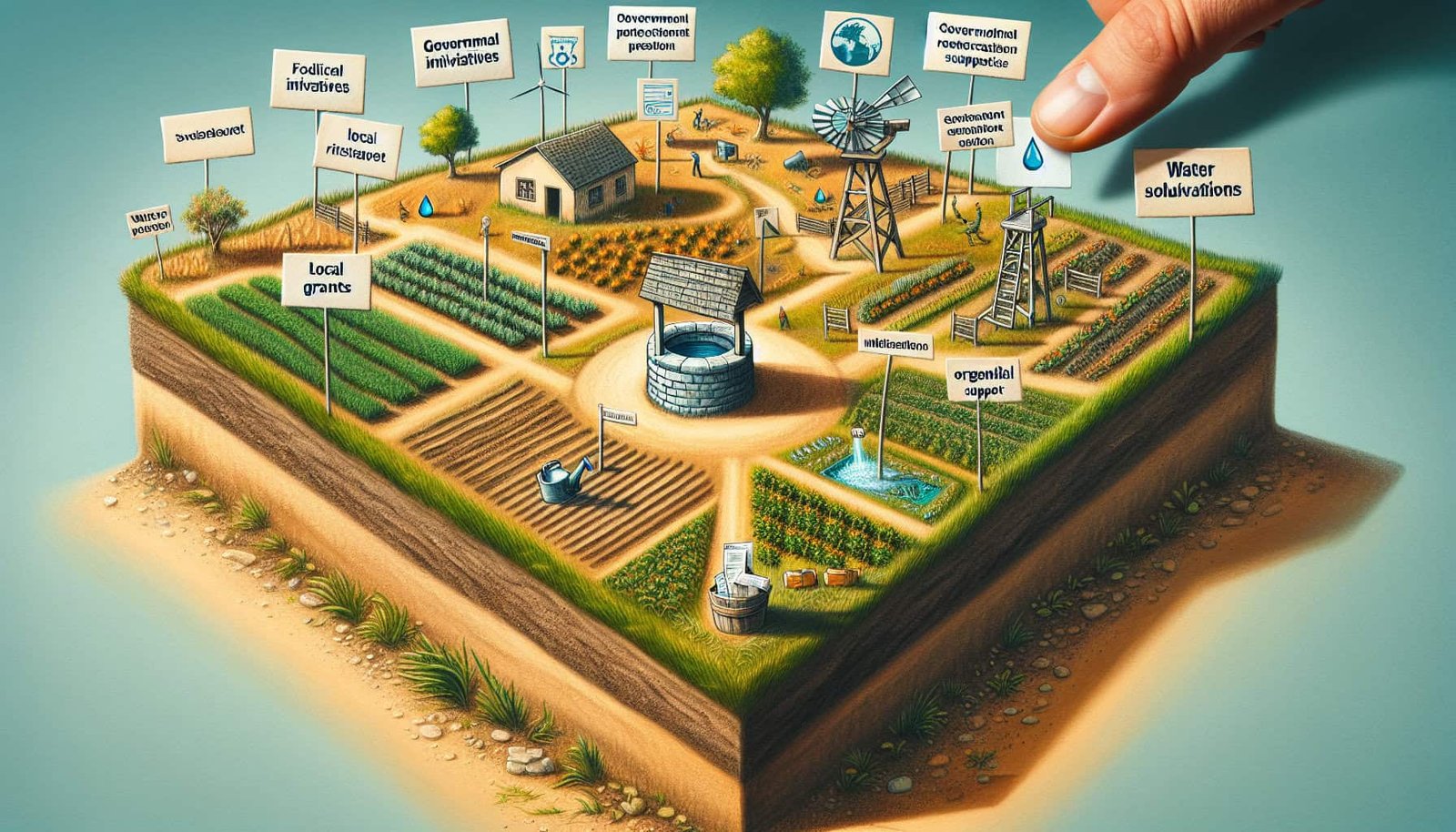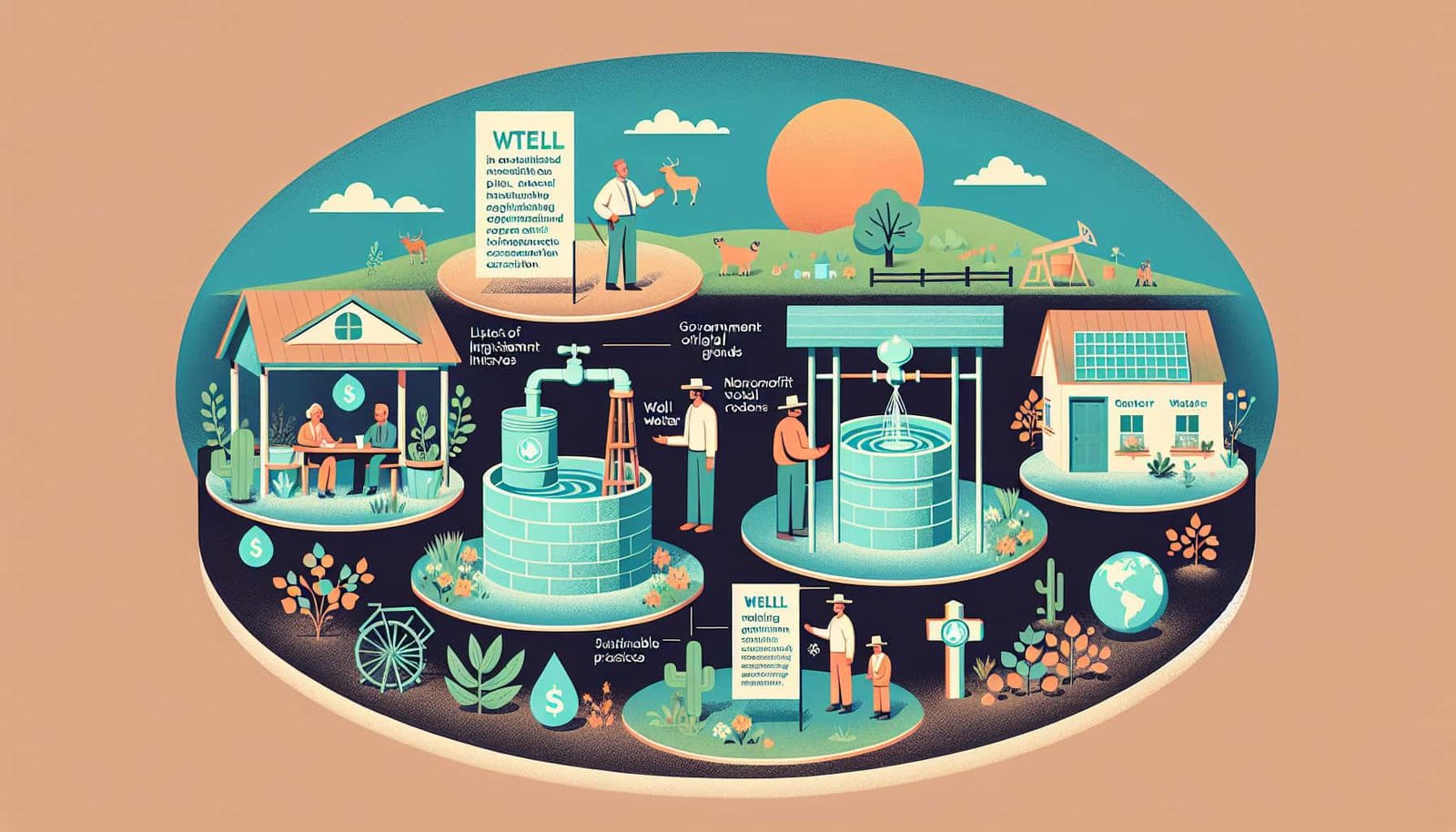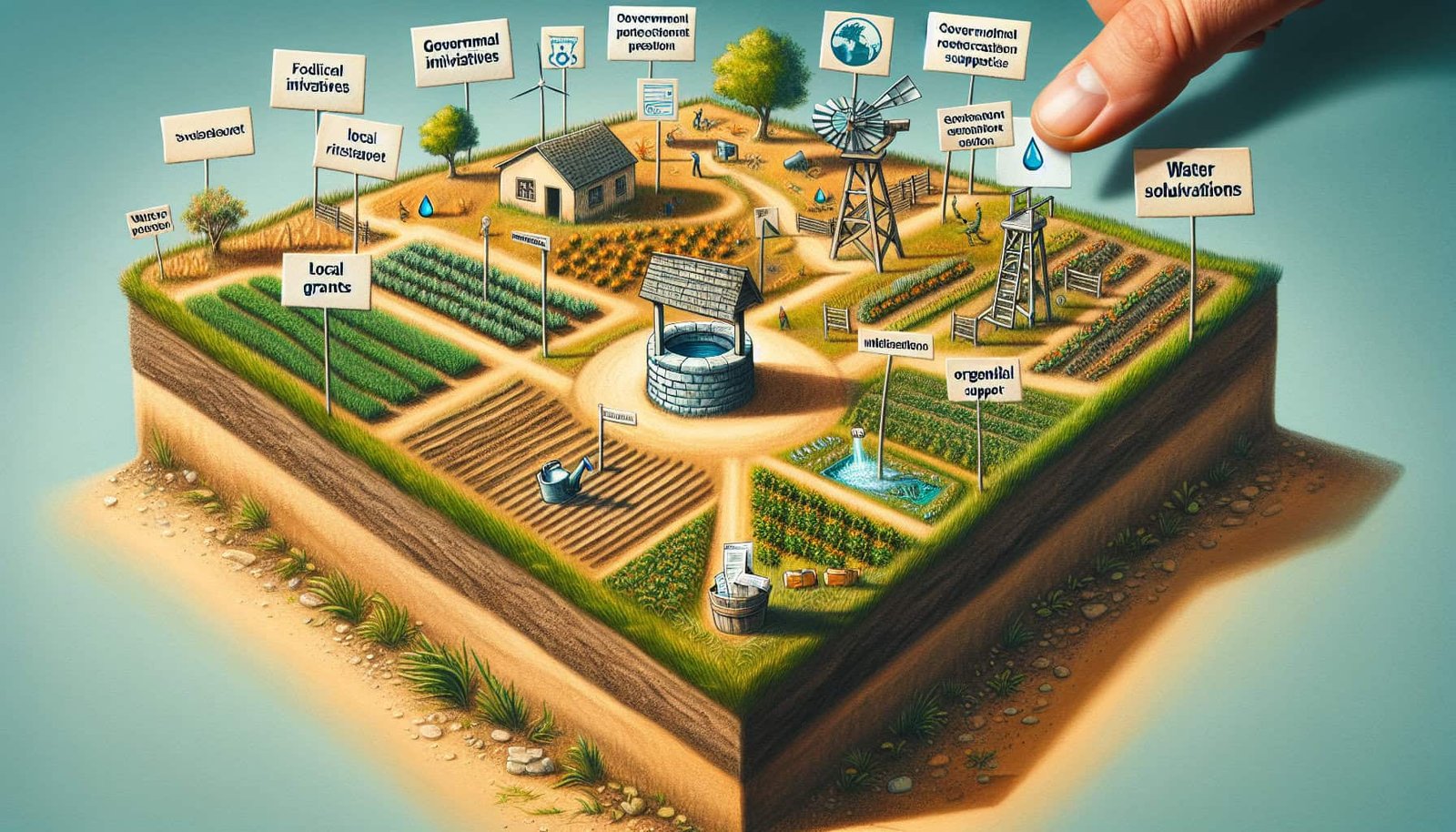Are you a well owner who wants to conserve water, but don’t know where to find resources and incentives? Look no further! This article will guide you on where to locate the information you need. Whether you’re searching for tips to reduce water usage or grants to help with water conservation efforts, we’ve got you covered. So join us as we explore the various avenues available for well owners interested in well water conservation incentives.

Government Agencies
Environmental Protection Agency (EPA)
The Environmental Protection Agency (EPA) is a federal government agency dedicated to protecting human health and the environment. They provide resources and information on water conservation, including strategies for well owners. The EPA offers guidelines on proper well maintenance, water pollution prevention, and water conservation practices. By visiting their website, you can find useful information on well water testing, treatment methods, and regulations related to well ownership and conservation.
Department of Agriculture
The Department of Agriculture plays a vital role in promoting sustainable agriculture practices, including water conservation. They offer resources and programs aimed at assisting well owners in conserving water on their properties. Through the Department of Agriculture, you can access information on efficient irrigation methods, soil conservation techniques, and grants or incentives available for implementing water-saving measures on agricultural land.
Department of Natural Resources
The Department of Natural Resources partners with local communities to protect and manage natural resources, including groundwater. They provide support and guidance to well owners interested in conserving water. By reaching out to your local Department of Natural Resources office, you can learn about conservation programs, water use regulations, and educational materials to help you better understand the importance of water conservation and how to implement it on your property.
Local Utilities
Water Districts
Local water districts are responsible for providing safe and reliable water supplies to communities. They often offer resources and programs specifically tailored to well owners. By contacting your local water district, you can inquire about water conservation initiatives, rebate programs for water-saving devices, and educational materials on well water conservation. They can provide guidance on reducing water usage, improving water quality, and promoting sustainable water management practices.
Public Works Departments
Public works departments within your municipality or county are responsible for managing public infrastructure, including water resources. These departments often provide information and resources on well water conservation for residents in their jurisdiction. They may offer workshops, educational materials, and even financial assistance programs to incentivize well owners to conserve water and adopt sustainable practices.
Conservation Organizations
There are numerous conservation organizations dedicated to protecting and preserving natural resources, including water. These organizations often provide resources, advice, and programs specifically aimed at well owners. They can offer guidance on water conservation practices, promote sustainable land management, and provide information on available grants or incentives for implementing conservation measures. Connecting with local conservation organizations can be a valuable way to gain knowledge and support in your efforts to conserve water.
Nonprofit Organizations
Water Conservation Associations
Nonprofit water conservation associations focus on promoting water conservation practices among well owners. They provide resources such as educational materials, workshops, and guidance on implementing water-saving measures at the individual and community levels. These organizations may also advocate for policies and initiatives that support well owners in their conservation efforts. By getting involved with a water conservation association, you can access a wealth of information, connect with fellow well owners, and contribute to the broader effort of conserving water resources.
Environmental Groups
Environmental groups work to protect and preserve the environment, including water sources. They often provide resources and support for well owners interested in conserving water. These groups can offer information on sustainable practices, water management strategies, and opportunities to get involved in conservation initiatives. By collaborating with environmental groups, you can learn from their expertise and contribute to the collective goal of conserving water for a more sustainable future.
Well Owner Associations
Well owner associations are dedicated to supporting and advocating for the interests of well owners. They provide resources, education, and networking opportunities for individuals who rely on well water. These associations can offer guidance on water conservation practices, well maintenance, and water quality management. By joining a well owner association, you gain access to a community of like-minded individuals who can provide valuable insights and support in your well water conservation journey.
Online Databases and Websites
Water Conservation Incentive Program Database
The Water Conservation Incentive Program Database is an online resource that compiles information specifically related to incentives and grants available for water conservation efforts. This database provides a comprehensive list of programs offered by various organizations, including government agencies, nonprofit groups, and financial institutions. By exploring this database, you can identify potential funding opportunities and incentives specific to well water conservation, helping you implement sustainable practices while minimizing financial burden.
Well Owner Resource Centers
Well Owner Resource Centers are online platforms that offer a wide range of information, tools, and resources for well owners. These centers are typically operated by governmental agencies, nonprofit organizations, or educational institutions. They provide guidance on proper well maintenance, water testing, conservation practices, and relevant regulations. Well Owner Resource Centers are valuable sources of information, assisting well owners in making informed decisions about their well water usage and conservation efforts.
Online Forums and Communities
Online forums and communities dedicated to well owners and water conservation can serve as excellent sources of information and support. These platforms allow well owners to connect, share experiences, ask questions, and learn from one another. Participating in online discussions can provide valuable insights into water conservation practices, troubleshooting common issues, and discovering new resources. By engaging in these communities, you can gain knowledge, receive guidance, and connect with individuals who share your interest in conserving well water.

Educational Institutions
Agricultural Colleges
Agricultural colleges and universities often have departments or programs focused on sustainable agriculture and water conservation. These institutions conduct research, offer courses, and provide extension services to assist well owners in implementing water-saving practices. They can provide advice on efficient irrigation methods, water management techniques, and strategies for maintaining soil health to optimize water absorption. Collaborating with agricultural colleges can help you acquire specialized knowledge and stay up-to-date on the latest advancements in well water conservation.
Environmental Science Departments
Environmental science departments within educational institutions study the interactions between human activities and the environment, including water resources. These departments offer research, educational programs, and resources related to water conservation. They can provide guidance on identifying potential sources of contamination, implementing best management practices, and promoting sustainable water use. Engaging with environmental science departments can expand your understanding of well water conservation and equip you with the necessary tools to make informed decisions.
Geology and Hydrology Research Centers
Geology and hydrology research centers focus on understanding the geological and hydrological processes that influence water availability and quality. These centers conduct research, develop innovative approaches, and provide resources related to water conservation. They can offer insights into groundwater recharge mechanisms, aquifer storage and recovery, and sustainable water management strategies. By accessing the knowledge and expertise of geology and hydrology research centers, you can gain a deeper understanding of the science behind well water conservation and apply it to your own practices.
Local Extension Offices
Cooperative Extension Offices
Cooperative extension offices are local offices affiliated with land-grant universities, typically offering a range of agricultural education and outreach programs. They can provide valuable resources and expertise to well owners interested in water conservation. Cooperative extension offices often offer workshops, demonstrations, and publications on water-saving techniques, well maintenance, and sustainable land management practices. By reaching out to your local cooperative extension office, you can tap into a wealth of information and support tailored to your specific area.
Agriculture Extension Services
Agriculture extension services, typically associated with land-grant universities, focus on providing agricultural education and support to local communities. They can offer guidance on water management practices, optimal irrigation techniques, and the use of precision agriculture technologies to minimize water usage. Agriculture extension services work closely with well owners to promote sustainable water practices that minimize environmental impacts while maintaining agricultural productivity. Engaging with agriculture extension services can help you make informed decisions regarding water conservation on your property.
Water Resource Management Offices
Water resource management offices are local government entities responsible for overseeing and managing water resources within a specific area. These offices typically provide resources, information, and programs related to water conservation. They can offer guidance on water rights, water use regulations, and water management strategies for well owners. By connecting with your local water resource management office, you can access region-specific information and support to enhance your well water conservation efforts.

Water Testing Laboratories
Private Testing Laboratories
Private testing laboratories specialize in analyzing water samples to evaluate water quality and identify potential contaminants. These laboratories can provide well owners with comprehensive information about their water’s composition and potential risks. By conducting regular water testing, well owners can make informed decisions about water treatment and conservation efforts. Private testing laboratories offer a range of testing services, including analysis for bacteria, chemicals, and minerals, ensuring that well owners have the necessary information to protect their water resources.
University Research Labs
University research labs dedicated to water quality and conservation often offer water testing services to the public. These labs conduct high-quality research and testing, using advanced methods to analyze water samples. By utilizing university research labs, well owners can access reliable and accurate information about their water quality, identifying potential issues and taking appropriate actions to conserve water and protect their health. Collaborating with university research labs allows well owners to benefit from the knowledge and expertise of dedicated researchers in the field of water conservation.
Local Well Drillers and Contractors
Well Drilling Companies
Well drilling companies specialize in drilling and constructing wells for residential, commercial, and agricultural purposes. These companies often have extensive knowledge and experience related to well water resources and conservation. Well drilling companies can provide guidance on well design and construction techniques that enhance water conservation, such as proper well depth, casing materials, and sealing practices. Consulting with well drilling companies allows well owners to optimize their wells for efficient water use and minimize potential waste.
Pump Installation and Repair Contractors
Pump installation and repair contractors play a crucial role in maintaining the functionality and efficiency of well water systems. These contractors can offer advice on selecting and installing energy-efficient pumps, optimizing well performance, and detecting and repairing any leaks or malfunctions. By consulting with pump installation and repair contractors, well owners can ensure that their water systems operate efficiently, reducing unnecessary water consumption and avoiding potential water losses.

Professional Associations
National Ground Water Association (NGWA)
The National Ground Water Association (NGWA) is an organization dedicated to advancing the groundwater industry and promoting responsible governance of groundwater resources. The NGWA offers resources and educational materials for well owners interested in water conservation. They provide information on best management practices, sustainable well construction, and maintenance techniques to maximize water conservation. By becoming a member of NGWA, well owners can stay informed about industry developments, connect with professionals, and gain access to specialized resources.
American Water Works Association (AWWA)
The American Water Works Association (AWWA) is an organization focused on providing leadership and resources in the field of drinking water supply and water quality management. Although primarily serving public utilities, the AWWA also provides guidance and information for private well owners. They offer resources on water conservation practices, water treatment techniques, and sustainable water management strategies. Well owners can benefit from joining the AWWA to access a wealth of knowledge and network with professionals involved in water supply and conservation.
Water Environment Federation (WEF)
The Water Environment Federation (WEF) is a nonprofit technical and educational organization focused on preserving and enhancing the global water environment. The WEF offers resources and programs aimed at promoting sustainable water practices and water conservation efforts. Their publications and conferences cover a wide range of topics, including water reuse, wastewater management, and water quality. Well owners interested in understanding the broader water environment and learning about innovative conservation approaches can benefit from the resources and expertise provided by the WEF.
Financial Institutions and Grants
Banks and Credit Unions
Banks and credit unions often offer financing options, loans, or specialized programs to support water conservation initiatives, including those aimed at well owners. These financial institutions may provide guidance and access to funds for implementing water-saving measures, such as installing efficient irrigation systems or upgrading well water treatment systems. By exploring the offerings of various banks and credit unions, well owners can identify financial resources to support their water conservation efforts and make sustainable investments.
Environmental Grant Programs
Many organizations, including governmental agencies, nonprofit entities, and private foundations, offer grants specifically targeted at supporting water conservation projects. These grant programs often include initiatives geared towards well owners interested in water conservation. By researching and applying for these environmental grant programs, well owners can potentially secure funding to implement water-saving measures, conduct research, or launch educational campaigns related to well water conservation. These grants can significantly facilitate the adoption of sustainable practices without imposing substantial financial burdens on well owners.
Agricultural Funding Opportunities
Agricultural funding opportunities are often available to support water conservation efforts on farms and agricultural operations. These funding opportunities can include grants, cost-share programs, or loans provided by government agencies and agricultural organizations. Well owners engaged in agricultural activities can explore these funding options to invest in irrigation infrastructure upgrades, soil conservation practices, or the implementation of precision agriculture techniques. By taking advantage of agricultural funding opportunities, well owners can maximize water conservation efforts while ensuring the long-term sustainability of their farming operations.
In conclusion, there are abundant resources available for well owners interested in well water conservation incentives. Whether through government agencies, nonprofit organizations, educational institutions, online databases, or local professionals, well owners have access to a wealth of information, support, and financial assistance. By tapping into these resources and implementing water-saving practices, well owners can contribute to the conservation of water resources, protect the environment, and ensure the sustainability of their own water supply.


